The Magnificent Ambersons is a american film of genre Drama directed by Orson Welles released in USA on 10 july 1942 with Joseph Cotten
The Magnificent Ambersons (1942)
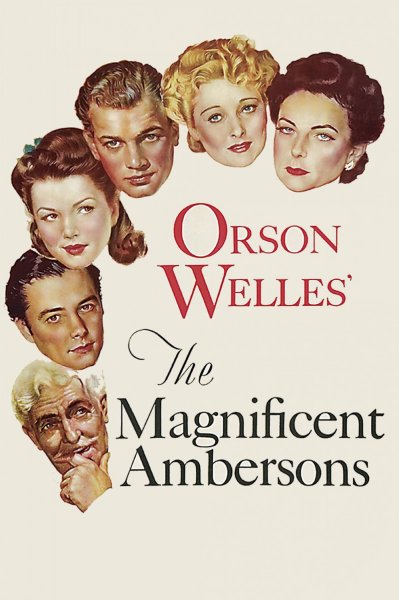
If you like this film, let us know!
- Infos
- Casting
- Technical infos
- Photos
- Videos
- Film quotes
- Characters
- Music
- Awards
The Magnificent Ambersons is a 1942 American period drama, the second feature film produced and directed by Orson Welles. Welles adapted Booth Tarkington's Pulitzer Prize-winning 1918 novel, about the declining fortunes of a proud Midwestern family and the social changes brought by the automobile age. The film stars Joseph Cotten, Dolores Costello, Anne Baxter, Tim Holt, Agnes Moorehead and Ray Collins, with Welles providing the narration.
Welles lost control of the editing of The Magnificent Ambersons to RKO, and the final version released to audiences differed significantly from his rough cut of the film. More than an hour of footage was cut by the studio, which also shot and substituted a happier ending. Although Welles's extensive notes for how he wished the film to be cut have survived, the excised footage was destroyed. Composer Bernard Herrmann insisted his credit be removed when, like the film itself, his score was heavily edited by the studio.
Even in the released version, The Magnificent Ambersons is often regarded as among the best U.S. films ever made, a distinction it shares with Welles's first film, Citizen Kane. The film was nominated for four Academy Awards, including Best Picture, and it was added to the National Film Registry of the Library of Congress in 1991.
Synopsis
The Ambersons are by far the wealthiest family in the small midwestern city of Indianapolis. It is the turn of the 20th century, and life is peaceful. Eugene Morgan as a young man courts Isabel Amberson, but she rejects him even though she loves him. Isabel instead marries Wilbur Minafer, a passionless man she does not love. They have a child, George, whom she spoils and who becomes the terror of the town.Actors

Joseph Cotten
(Eugene Morgan)

Dolores Costello
(Isabel Amberson Minafer)
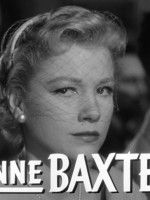
Anne Baxter
(Lucy Morgan)

Tim Holt
(George Minafer)

Agnes Moorehead
(Fanny Minafer)
Comments
Leave comment :
Suggestions of similar film to The Magnificent Ambersons
There are 304 films with the same actors, 102 films with the same director, 69187 with the same cinematographic genres (including 748 with exactly the same 3 genres than The Magnificent Ambersons), 1428 films with the same themes, to have finally 70 suggestions of similar films.If you liked The Magnificent Ambersons, you will probably like those similar films :

The Sound of Music (1965)
, 2h54Directed by Robert Wise, Richard Lang
Origin USA
Genres Drama, War, Biography, Musical theatre, Historical, Musical, Romance
Themes Films about families, Films about music and musicians, Films about religion, Théâtre, Musical films, Political films, Films based on plays, Films based on musicals, Children's films
Actors Julie Andrews, Christopher Plummer, Eleanor Parker, Bill Lee, Bill Lee, Richard Haydn
Rating80%





Maria is a free-spirited young Austrian woman studying to become a nun at Nonnberg Abbey in Salzburg in 1938. Her love of music and the mountains, her youthful enthusiasm and imagination, and her lack of discipline cause some concern among the nuns. The Mother Abbess, believing Maria would be happier outside the abbey, sends her to the villa of retired naval officer Captain Georg von Trapp to be governess to his seven children—Liesl, Friedrich, Louisa, Kurt, Brigitta, Marta, and Gretl. The Captain has been raising his children alone using strict military discipline following the death of his first wife. At first, the children treat Maria as they did their former governesses—playing tricks on her as a way of gaining their father's attention. Maria responds with kindness and patience, and soon the children come to trust and respect her.

Citizen Kane (1941)
, 1h59Directed by Orson Welles
Origin USA
Genres Drama, Comedy
Themes Films about journalists, Films about music and musicians, Hitler
Actors Joseph Cotten, Orson Welles, Dorothy Comingore, Everett Sloane, Ray Collins, George Coulouris
Rating82%





In a mansion in Xanadu, a vast palatial estate in Florida, the elderly Charles Foster Kane is on his deathbed. Holding a snow globe, he utters a word, "Rosebud", and dies; the globe slips from his hand and smashes on the floor. A newsreel obituary tells the life story of Kane, an enormously wealthy newspaper publisher. Kane's death becomes sensational news around the world, and the newsreel's producer tasks reporter Jerry Thompson with discovering the meaning of "rosebud".

Citizen Kane Trailer (1940)
, 4minutesDirected by Orson Welles
Origin USA
Actors Ray Collins, Joseph Cotten, Everett Sloane, Dorothy Comingore, George Coulouris, Agnes Moorehead
Rating75%





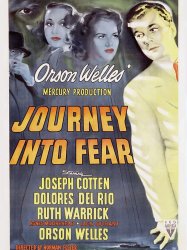
Journey into Fear (1943)
, 1h8Directed by Norman Foster, Orson Welles
Origin USA
Genres Drama, War, Thriller, Spy, Historical, Noir
Themes Spy films, Political films
Actors Joseph Cotten, Dolores del Río, Ruth Warrick, Orson Welles, Agnes Moorehead, Everett Sloane
Rating64%





In an opening scene before the credits an assassin, Banat, is seen preparing a gun while a gramophone skips as it plays. The story that follows is the narrative of a letter from Howard Graham, an American armaments engineer, to his wife Stephanie. While journeying to the Soviet port of Batumi to return to the United States to complete his business with the Turkish Navy, Graham and his wife stop in Istanbul and are met by Kopeikin, a Turkish employee of Graham's company, who under the pretense of discussing business, takes Graham to a nightclub to introduce him to dancer Josette Maretl and her partner Gogo. When Banat tries to kill Graham during a magic act, he shoots the magician instead, and Graham is brought to the headquarters of the Turkish secret police for questioning. Colonel Haki of the secret police warns Graham that German agents are trying to kill him to delay the re-arming of Turkish ships. He shows Graham a photograph of Banat, whom he says was hired by a Nazi agent named Muller, and orders Graham to travel secretly to Batumi aboard a tramp steamer instead of by train. Haki assures him that he will personally see that Stephanie gets to their hotel in Batumi ahead of him.
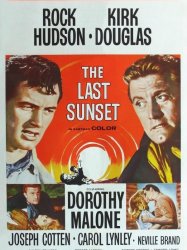
The Last Sunset (1961)
, 1h47Directed by Robert Aldrich
Origin USA
Genres Drama, Action, Romance, Western
Themes Films about families, Films about sexuality
Actors Rock Hudson, Kirk Douglas, Dorothy Malone, Joseph Cotten, Carol Lynley, Neville Brand
Rating66%





Brendan O'Malley (Douglas) crosses the border into Mexico to escape justice for a murder. He arrives at the ranch of a former lover, Belle Breckenridge (Malone) and her husband, the drunkard and coward John Breckenridge (Joseph Cotten).

Othello (1951)
, 1h30Directed by Orson Welles
Origin USA
Genres Drama, Romance
Themes Seafaring films, Théâtre, Transport films, Films based on plays, Films based on works by William Shakespeare
Actors Orson Welles, Suzanne Cloutier, Doris Dowling, Joseph Cotten, Robert Coote, Joan Fontaine
Rating74%





À Venise, les succès militaires du général Othello, dit le maure, et son mariage avec la belle Desdémona, fille du sénateur Barbantio, suscitent à la fois l'admiration et la jalousie. Iago, lieutenant d'Othello, va semer le doute dans l'esprit de son général quant à la fidélité de son épouse. Cupide, Iago ne cherche qu'à assouvir son ambition, et tente de parvenir à ses fins en manipulant adroitement chaque personnage.

A Delicate Balance (1973)
, 2h13Directed by Tony Richardson
Origin USA
Genres Drama
Themes Films about families, Films based on plays
Actors Katharine Hepburn, Paul Scofield, Lee Remick, Kate Reid, Joseph Cotten, Betsy Blair
Rating64%





The film spans three days in the life of Agnes and Tobias, an upper middle class couple who share their comfortable suburban Connecticut home with her acerbic alcoholic sister Claire. It is matriarch Agnes who helps the trio maintain a delicate balance in their lives, held together by habit, shared memories, and considerable consumption of dry martinis.

Crimson Peak (2015)
, 1h59Directed by Guillermo del Toro
Origin USA
Genres Drama, Thriller, Fantastic, Fantasy, Horror, Historical, Romance
Themes Films about writers, Films about families, Films about sexuality, Ghost films
Actors Mia Wasikowska, Tom Hiddleston, Jessica Chastain, Charlie Hunnam, Jim Beaver, Burn Gorman
Rating65%





In 1887, Edith Cushing, the young daughter of wealthy American businessman Carter Cushing, is visited by her mother's ghost who warns her, "beware of Crimson Peak."
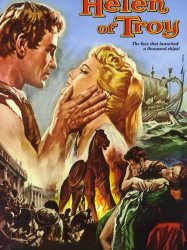
Helen of Troy (1956)
, 1h54Directed by Robert Wise, Raoul Walsh, Sergio Leone
Origin USA
Genres Drama, War, Action, Adventure, Historical, Peplum, Romance
Themes Films based on mythology, Films based on Greco-Roman mythology, Political films, Dans la Grèce mythologique, Films based on Greco-Roman mythology
Actors Jacques Sernas, Rossana Podestà, Cedric Hardwicke, Stanley Baker, Niall MacGinnis, Robert Douglas
Rating61%





The film retells the story of the Trojan War, albeit with some major changes from the Iliad's storyline: Paris of Troy (Jacques Sernas) sails to Sparta to secure a peace treaty between the two powerful city-states. His ship is forced to return to Troy in a storm after he has been swept overboard on the shore of Sparta. Paris is found by Helen, Queen of Sparta (Rossana Podestà), with whom he falls in love. He goes to the palace where he finds Helen's husband, King Menelaus (Niall MacGinnis), Agamemnon (Robert Douglas), Odysseus (Torin Thatcher), Achilles (Stanley Baker) and many other Greek kings debating whether to go to war with Troy. Menelaus, who is denied by Helen, sees that his wife and Paris are in love and, pretending friendship, plots Paris' death.

How Green Was My Valley (1941)
, 1h58Directed by John Ford
Origin USA
Genres Drama, Historical, Romance
Themes Films about families, Films about the labor movement, Political films, Children's films
Actors Walter Pidgeon, Irving Pichel, Maureen O'Hara, Anna Lee, Donald Crisp, Roddy McDowall
Rating76%





The film opens with a monologue by an older Huw Morgan (voice by Irving Pichel): "I am packing my belongings in the shawl my mother used to wear when she went to the market. And I'm going from my valley. And this time, I shall never return." The valley and its villages are now blackened by the coal mines that fill the area.
 Connection
Connection